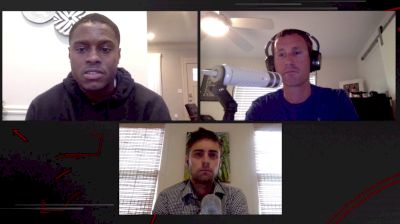Coleman Struggling To Find Sympathy Among Elite T&F Peers
Coleman Struggling To Find Sympathy Among Elite T&F Peers
Christian Coleman argues that his third whereabouts violation was not his fault. Some of his fellow track and field elites aren't buying it.

The crux of Christian Coleman’s argument that he arrived back at home on December 9, 2019, during his drug testing window and therefore should not have incurred a whereabouts violation rests on whether or not you trust the sprinter.
The Athletics Integrity Unit (AIU), for as little information they’ve provided on the case, apparently do not, as an investigation into Coleman’s activities that night was not enough to spare him from a provisional suspension on Wednesday. Their version of the facts have not yet been released, but according to Coleman, a set of receipts from a nearby mall have not worked to prove that he was home when he said he was.
The world champion’s pleas that he didn’t receive a phone call alerting him to the drug tester have also fallen on deaf ears, as the AIU states they are under no obligation to do so. Coleman’s case is at the mercy of his own word— and perhaps an incorrect address— and that so far has failed to clear a man who has previously struggled to dot his Is and cross his Ts under the whereabouts system.
Embroiled in his second whereabouts controversy within a year, Coleman is asking the track world to believe that he is a victim of a system deliberately targeting him. For many, that's a step they're not willing to take.
A few points. Thread.
— Dai Greene (@DaiGreene) June 17, 2020
1) "I've been contacted by phone literally every other time I've been tested"
Doping Control Officers do not ring athletes to give them a heads up that they are looking for them to test them. Disturbing that this is the norm for you https://t.co/JCvefYYHBd
13) Last year you got off for the same sanction. To let it happen to you again is astounding. Being at your hour slot each day is a small price to pay for the life this sport has given to you and to help fight for an equal playing field for all athletes. Regardless of whether...
— Dai Greene (@DaiGreene) June 17, 2020
Now the 100m Olympic gold medal favorite is in danger of missing the Olympics unless his appeal is met with more sympathy than the initial AIU investigation. That very well could happen— there’s plenty of precedent for it happening— but there does seem to be a disconnect between what Coleman believes is fair and what is expected of one of the most high profile track and field athletes in the world.
The fastest man in the world each of the last three seasons acknowledged his understanding that his gold level status in the sport comes with the added responsibility of being tested more than the average athlete. But for him, that responsibility did not extend to him taking extra precaution by staying at home throughout the extent of his testing window, and it’s that disregard that his critics cite as proof that Coleman brought this on himself, regardless of the particulars.
It’s clear to me he struggles to understand rules, process, professionalism. We should not assume his lack of understanding of those to means he’s not hiding something. That’s always a possibility and that is the purpose of the anti-doping process and suspension for violating it. https://t.co/W84vL3Bv3C
— Michael Johnson (@MJGold) June 18, 2020
For someone like Michael Johnson, who, like Coleman, knows what life is like in track and field’s upper crust, this issue comes down to the 24-year-old not differentiating between what he deems reasonable and what’s in the rules. If you’re not taking the time to familiarize yourself with every aspect of your job, who’s to say there’s not another shortcut you’re willing to take?
While it is possible that the doping control officer had the wrong address for Coleman and was banging on the incorrect door every 10 minutes for an hour, one has to believe either that the AIU is operating in bad faith or that their investigation was woefully incompetent. Of course, that could be true, and Coleman’s appeal will likely center around what he says is not his address written on the report.
But it’s telling to me that some of Coleman’s peers see this first as a man not respecting the position he was in as a 100m champion who was already sitting on two strikes.
“I see it as you’re being irresponsible. If it’s the other things, whatever. That’s something that I trust the organizations to figure out,” triple jump world and Olympic champion Christian Taylor told CNN.
“There’s no excuse valid for this. I miss it, I miss it. That’s my mistake. After one (missed test), you should have woken up. After two, it should never happen… When is that light bulb going to go off?”
On his 30th birthday, a completely honest & open conversation between @Taylored2jump and @AmandaDCNN on @cnnsport.
— Jeff Freeman (@JFreemanTV) June 18, 2020
I urge everyone to listen to it in its entirety.
He spoke about many many things, including his stance on anti-doping & whereabouts. https://t.co/ymmdUteywr pic.twitter.com/yOXZaEBGAt
Coleman says he was back from shopping at the mall inside his testing window, and that he is being unfairly charged since he was not aware that the officer was trying to test him. It’s not wildly far-fetched to believe his account, especially since he had grown accustomed to receiving phone calls about impending tests.
It’s clear, however, that the AIU doesn’t buy it, and that some of the biggest names in the sport don’t see Coleman as deserving the benefit of the doubt.